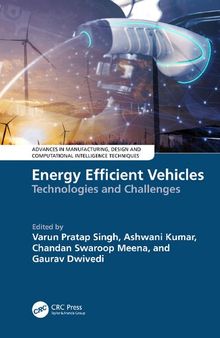 جزییات کتاب
جزییات کتاب
The text discusses energy-efficient vehicles as an essential element of sustainable transportation. The text highlights the social, economic, and environmental benefits associated with energy-efficient automobiles, which effectively solve the issue of greenhouse gas emissions, improve air quality, boost energy security, and promote zero-emission. The energy-efficient technologies for transportation, accessibility and safety of the transport system, environmental footprint, health impact, economic development, and social growth are the central theme of the book. It further presents future integrated mobility-energy systems and sustainability indicators.This book:Examines policies, challenges, and the latest developments in the field of sustainable mobility.Discusses the latest advances in the field of energy storage systems, batteries, image processing, obstacle identification, and automatic gear trains.Highlights the safety, security, and risk management related to sustainable transportation, covering zero emissions and sustainability indicators.Presents electric vehicle grid integration and infrastructure for e-vehicle charging.Aims to provide an overview of various aspects of EV, HEV, ITS, and vehicular network deployment design, encompassing the technological advancements, challenges, and opportunities associated with this rapidly evolving field.Understanding the transportation needs and preferences of youth populations in shaping transportation policy and promoting sustainable urban development to design transportation systems that are efficient, equitable, and environmentally sustainable.Synergize exploration related to the various properties and functionalities through extensive theoretical and numerical modeling present in the energy sector.This book is primarily written for senior undergraduate, graduate students, and academic researchers in fields including mechanical engineering, industrial engineering, automotive engineering, manufacturing engineering, and environmental engineering.



 دانلود کتاب
دانلود کتاب

 جزییات کتاب
جزییات کتاب





 این کتاب رو مطالعه کردید؟ نظر شما چیست؟
این کتاب رو مطالعه کردید؟ نظر شما چیست؟
